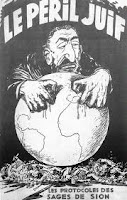Arriving at the turn of the 20th century, and discredited as fabrication cobbled together from fragments of fiction and fantasy soon after, the Protocols were inessential for the Jew-hater, but they held, and in some quarter still hold, a place of honor as proof positive that the slanders of centuries were true, that the Jews, the rats inhabiting the cellar of humanity, were laying humbly in wait for the moment to strike at the bosom of the Christian West. Every move of the Jew was, almost by definition, deceptive and manipulative: they suffered (or, some might say, exploited) the degradations of the ghetto and the periodic pogroms as they bided their time. They secretly encouraged godlessness and the freedoms of the so-called “Enlightenment” in order to weaken the power of the Church and the princes of the West, and to encourage a moral laxity that would rot civilization from the inside.
We love a conspiracy, because we love the feeling that we are in possession of a great truth, the feeling that we have stolen a look behind the veil and have seen the world as it really is, not as the false reality that the foolish take at face value. And we love a scapegoat - a people on whom we can blame the ills of society. Any scapegoat will do, but few have had the pedigree of the Jews, who reached a climax of vulgarity when they murdered the Savior of the World, and duly suffered for it while paradoxically nurturing a secret network, digging labyrinthine tunnels beneath the bulwarks of order because they had a master plan (conspiracy is meaningless without a master plan) to enslave humanity and avenge the ills visited upon them for their deicide. For those willing to believe, the West has been in a race for centuries against this threat, which those in power have been content to ignore, for their wealth and power come from their being in cahoots, being willing to sell out their own for their own gain. There were occasional “cleansings” -slaughters and burnings - but a final solution was elusive, the Jews being protected by those they had manipulated into thinking they had something to gain by shielding them from all but minor harassments.
Such is the fantasy, such is the slander which led to the great conflagration of the last century, a pyre which the Protocols played their part in igniting. One must commend Umberto Eco, a 20th/21st century European, for being willing to scratch at the scab of anti-semitism and show us the proximate roots of that Holocaust. Ingeniously, and with his customary erudition, he weaves a novel of the strands of 19th century violence and social upheaval, of the various spectres haunting Europe. As he has made clear in interviews, all the characters save one (the central one) are actual, historical figures. Eco’s skill is to - as he did with his masterwork of occult conspiracy, Foucault’s Pendulum - construct a credible narrative of disparate elements which moves towards an inevitable and preordained (by subsequent history) conclusion. The fact that he can sustain this narrative for almost 450 pages under the narration of one of the most noxious characters in recent fiction, the repulsive forger Simone Simonini is, in itself, a commendable feat.
The plot itself defies easy summary. Needless to say (and again as with Foucault’s Pendulum) the attentive reader will have fun noting in the margins the dizzying references to a plethora of literary and historical figures, and if one is so inclined, reading the novel with Wikipedia close at hand might be fruitful as well, if one is unacquainted with, for instance, the works of the once popular and now forgotten novelist Eugene Sue (author of The Mysteries of Paris and The Wandering Jew) and a couple dozen other historical figures besides. One would have to be remarkably well-versed in European history to not need a crib sheet on, for instance, the Risorgimento or the Dreyfus Affair, as a means of deciphering Eco’s multi-layered narrative. Still, for those willing to spend some time and effort in unfamiliar territory as a means of gaining new insight into the origins of one of the most contemptible horrors of the 20th century, the exercise will be enlightening and - if it’s not inappropriate to say - entertaining.



